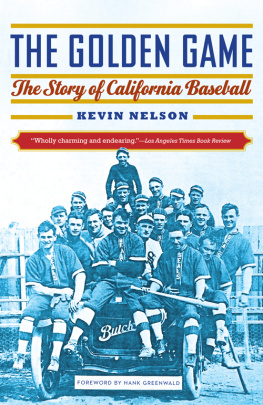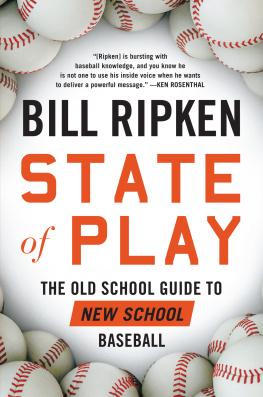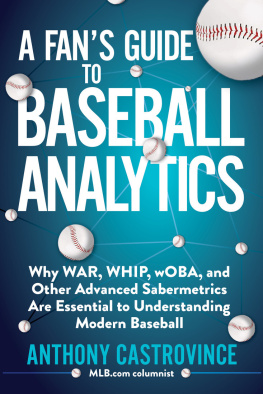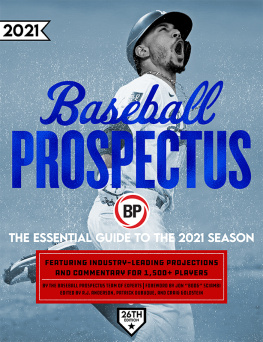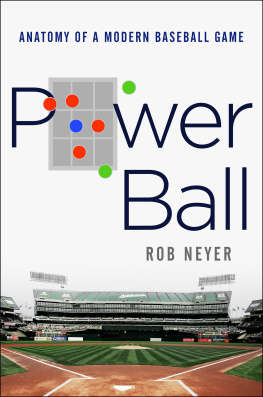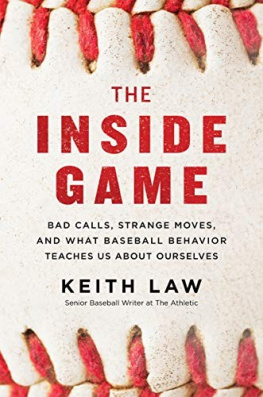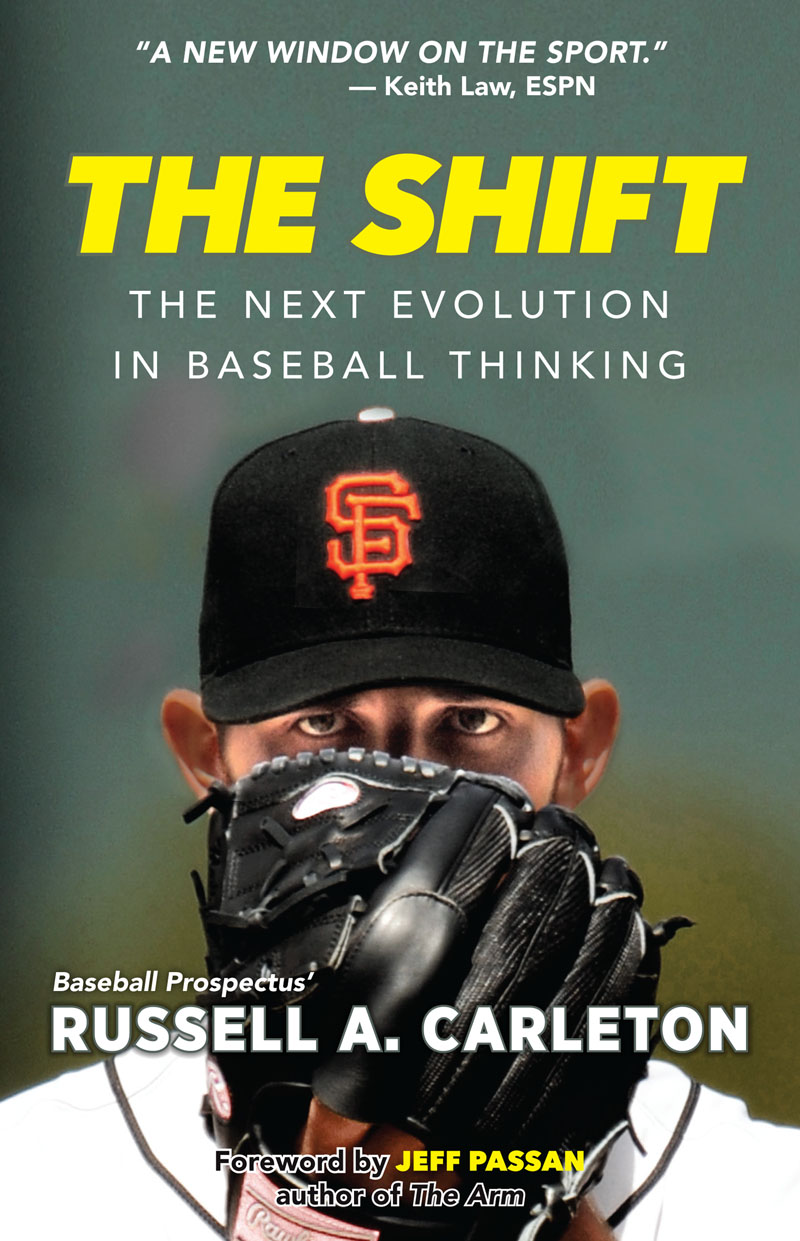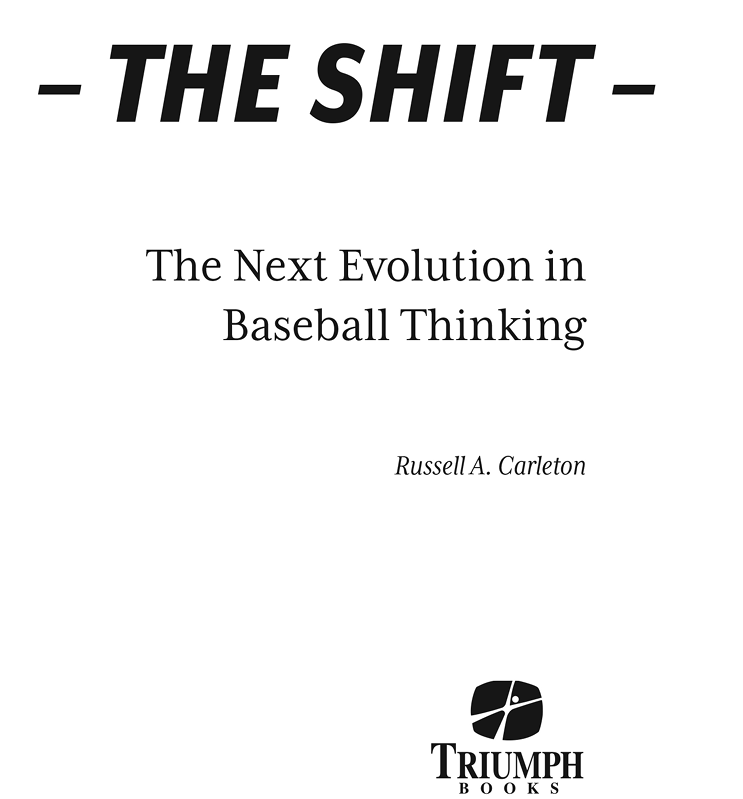
To my father, who took me to my first baseball game, and my mother, who learned about baseball so that she could have something to talk about with six-year-old me.
Contents
Foreword by Jeff Passan
I still remember the first time I read Russell Carleton. The cloistered world of baseball analysis treated the notion of intangibles with equal measures of doubt and disdain, and here was this guyat no less than Baseball Prospectus, the online bastion of statistical dogmatismwielding a scythe, happy to play the devil in the details.
Sabermetricians do not understand the human element of the game, he wrote in early 2010, and I was hooked, not just because Id waited years for someone to offer a rejoinder to the analysts who treated players like robots and games like static events instead of the living, breathing beasts they are. This was something greater. He was marrying numbers and psychology, the baseball worlds version of a blind date gone wrong. He was ipecac for those who had red-pilled themselves in to believing there was but one lens through which to view the baseball world, whose bible was the Book of Bill James.
Russells work, and by extension this book, is unlike anything Ive ever seen, and it comes at the perfect time, as Newtons Third Law reverberates across Major League Baseball. This year marks Moneyball s 15 th anniversary, and nearly every team finds itself in a similar place with regards to proprietary numbers. It isnt groupthink so much as a natural plateau of analytics. Only so much variation will exist when brilliant people educated similarly try to tackle similar data sets. The equal and opposite reaction is those brilliant people trying to understand what they missed during analytics ascent. And its piggybacking on so much of what Russell understands as well as anyone.
Take coaching. Front offices have long considered coaches as much of a nuisance as a tangible addition to understanding the game. The most worthless coaches engage in pop psychology full of vacuous suggestions and offer chestnuts that have spent decades roasting on an open fire. Executives today are starting to test the open-mindedness of coaches, trying to figure out who cares about extracting marginal advantages from certain situations, understand who can communicate and teach and lead. No longer is it simply about having information; the best coaches describe it, explain it, sell it. They are about to inherit a generation of players reared in an objective baseball world. Their job isnt to remind the players of a bygone era; its to prepare for the one coming.
We live in a world in which teams are actively studying the brain. A handful of clubs today test the mental acuity of prospective draft picks, minor league players, and even major leaguers using games on handheld devices. Those who score best get drafted higher and pushed to the major leagues more quickly, their brain treated like a 100-mph fastball, a unique skill that portends success. Some teams are starting to research brain waves in hopes of better understanding whether theres an objective measurement to determine whos likelier to play better in high-pressure moments. If the numbers cant tell us whos definitively clutch, maybe the brain can.
These truths have been found for years by Russell. His brain works differently than any of his peers. He asks smarter questions than mainstream sportswriters and more empathetic ones than those dabbling in sabermetrics. Hes kind enough to warn readers of an impending dive into wonkiness and talented enough to guide them through without a misstep. He believes the game deserves better than the narrative contrivances that for so long represented how baseballs story was told.
The internecine war between scouts and stats? Its not just dead. It barely existed. For every grizzled scout bellyaching about the nerds taking over, another recognized that nerds were going to win the whole time. The scouts who survived understand the value of analysts. The analysts who care for layers of depth to complement their reports turn to scouts. Their relationship is symbiotic, and the most capable master both languages and serve as conduits when the inevitable disagreement arrives.
When a vacuum exists, laughable scenarios germinate. A few years back, a player regaled me with a story about his teams effort to integrate analytics to its daily scouting reports. The team wanted to shift its defense more, so the front office prepared documents that showed the spray charts of a batters last 200 at-bats. The coaching staff balked. There were too many dots. So a new report arrived, with 100 at-bats of data. Nope. Too busy still. Only with a sample of 50far too small to glean anything substantivedid the coaches accept the new complement.
The player was incredulous. How could this organization be so willfully ignorant? And while thats a perfectly fair questionnot to mention one thats been resolved since then with a management overhaulits not the sort Russell bothers to ask, because thats more a rhetorical gripe. He wants to know what caused the organization not to do it. What are the ill effects a sabermetrically deficient franchise might suffer because of a simple lack of curiosity? Does organizational inertia keep bad actors from changing their ways?
In a sport obsessed with the micro, he is the macro. Information is everything, and while baseball has defined information as numbers, statistics, and the branches of those family trees, information also encompasses behavior, history, processes, systems, biases, communication, and, perhaps most important, decision-making.
Thats really what this book is about, and its what makes it unlike anything Ive ever read. Its a psychological exegesis dressed in a baseball uniform. Its a study of human natureof its triumphs and fallibilities, its strengths and weaknesses, its power and powerlessnessand how baseball falls prey to the very same patterns exhibited in other areas of life. Its an appeal to learn from these lessonslearn as a game and learn as people. Its a text for its moment.
Ive spent almost 15 years now trying to understand baseball better, and even though I immerse myself in it every day, its wide universe often proves too unwieldy to contextualize. Its greatest gift is the thinkers who transcend that, who look beyond the obvious, who challenge themselves and the wide array that loves the game, too, to do better by it. To drag it not kicking and screaming into a new era but spirit it through whatever barriers may still exist.
Fear not, purists: This book reaffirms the human element exists. Now sit back, relax, and let a brain doctor use a few numbers, a little bit of savoir-faire, and a whole lot of experience to explain how.
Jeff Passan
Prairie Village, Kansas
December 15, 2017
Introduction: Rule 1
Baseball is a game between two teams of nine players each, under direction of a manager, played on an enclosed field in accordance with these rules, under jurisdiction of one or more umpires.
Official Rules of Major League Baseball, Rule 1.01
Ive broken the real Rule 1 of baseball a grand total of one time in my life. Never willingly leave a baseball game early (unless you absolutely have to) . Sure enough, I picked exactly the wrong day to do it. It was August 5, 2001, and I was in my native Cleveland, home from college for the last part of summer break before heading back to school. Earlier that day, my buddy from high schoolwell call him Steve, because thats his namecalled me and recited the most wonderful poem in the English language. I have two tickets to the game tonight. Wanna go?


